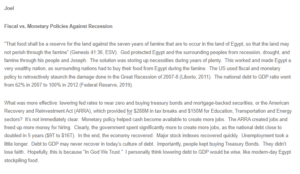Response – Fiscal vs. Monetary Policies Against Recession
Hello Joel,
According to the Economic Policy Institute (2019), the US is poorly prepared to face any future recessions, and it’s not because of the too-low interest rates and too-high public debt. The country is poorly prepared because, during the current expansion in the economy, inequality has not been reduced and also because policymakers have not fully appreciated the fact that fiscal policy and, more so, an increase in public spending is effective in aiding recovery and ending a recession. So while the Debt to GDP may never recover, as you have mentioned, the Bible reminds us that “For there is hope of a tree, if it be cut down, that it will sprout again, and that the tender branch thereof will not cease (Job 14:7).” Monetary policy can only act in a supporting role but is insufficient in solely fighting recessions. Policymakers should get rid of their political differences and unanimously agree on increasing public spending in the next recession, especially when the debt-to-GDP ratio is high. This is because evidence indicates that doing so is an effective way of quickly ending a recession. The policies should be effective both politically and economically to ensure engaged and broad support.
Reference
Economic Policy Institute (2019). What should we know about the next recession? https://www.epi.org/publication/next-recession-bivens/
ORDER A PLAGIARISM-FREE PAPER HERE
We’ll write everything from scratch
Question 
Joel
Fiscal vs. Monetary Policies Against Recession
“That food shall be a reserve for the land against the seven years of famine that are to occur in the land of Egypt, so that the land may not perish through the famine” (Genesis 41:36, ESV). God protected Egypt and the surrounding peoples from recession, drought, and famine through his people and Joseph. The solution was storing up necessities during years of plenty. This worked and made Egypt a very wealthy nation, as surrounding nations had to buy their food from Egypt during the famine. The US used fiscal and monetary policy to retroactively staunch the damage done in the Great Recession of 2007-8 (Liborio, 2011). The national debt to GDP ratio went from 62% in 2007 to 100% in 2012 (Federal Reserve, 2019).

Response – Fiscal vs. Monetary Policies Against Recession
What was more effective: lowering fed rates to near zero and buying treasury bonds and mortgage-backed securities, or the American Recovery and Reinvestment Act (ARRA), which provided for $288M in tax breaks and $150M for Education, Transportation and Energy sectors? It’s not immediately clear. Monetary policy helped cash become available to create more jobs. The ARRA created jobs and freed up more money for hiring. Clearly, the government spent significantly more to create more jobs, as the national debt close to doubled in 5 years ($9T to $16T). In the end, the economy recovered. Major stock indexes recovered quickly. Unemployment took a little longer. Debt to GDP may never recover in today’s culture of debt. Importantly, people kept buying Treasury Bonds. They didn’t lose faith. Hopefully, this is because “In God We Trust.” I personally think lowering debt to GDP would be wise, like modern-day Egypt stockpiling food.
References
Liborio, Costanza (2011). “Fiscal and Monetary Policy in Times of Crisis” St. Louis, MO: Federal Reserve Bank of St. Louis. <https://files.stlouisfed.org/files/htdocs/pageone-economics/uploads/newsletter/2011/201103.pdf >.
Federal Reserve Bank of St. Louis (2019) “Total Public Debt as a Percentage of Gross Domestic Product” <https://fred.stlouisfed.org/series/GFDEGDQ188S >.
Lisa – Monetary and Fiscal Policies
The 2007-2009 financial crises led to the Great Recession not only in the US but also the world over, leading to the European debt crisis and the Japanese exacerbation of economic stagnation Šehović (2015). The GDP in the US was 5.2 percent between the beginning of 2008 and the beginning of 2010. The US crisis peaked at the Lehman Brothers Investment Bank declaring bankruptcy in 2008. This led to a mass loss of jobs and investments. Many central banks across the developed nations, including the European Central Bank, Bank of Japan, and the Federal Reserve Bank, opted to utilize unconventional monetary policies, mainly the Quantitative Easing (QE), in an attempt to stimulate their respective economies. The conventional monetary policy in the US proved to be ineffective. Though the QE works at the direct lowering of interest rates in the long term, it is useless in reviving an economy characterized by an excessively indebted private sector that is attempting to deleverage Šehović (2015). Hence, fiscal policy becomes an essential stimulant for investment and spending in an economy that is over-indebted.
Monetary policy only indirectly stimulates aggregated demand (Dillard, 2018). The private sector’s net wealth is not increased by the monetary policy; it only changes the composition of its assets. Fullwiler & Wray (2010) argue that when the private sector treasures are converted into deposits (this is what QE does), it does not need to induce more spending by the private sector. When securities are bought by the central bank to increase the private sector’s deposits, the wealth of the private sector remains constant. Even when spending is done by the private sector, it is done from existing wealth and not because there has been a wealth increase.
Moreover, when the economy is already heavily indebted, a monetary policy that stimulates borrowing is not the best solution. In such a case, QE, which aims at stimulating spending and investment and lowering interest, is also ineffective. The private sector ends up increasing its spending if there is an increase in its financial wealth, and this can only be possible through fiscal policy.
References
Dillard, D. (2018). The economics of John Maynard Keynes: the theory of a monetary economy. Pickle Partners Publishing.
Fullwiler, S. T., & Wray, L. R. (2010). Quantitative easing and proposals for reform of monetary policy operations. Bard College Levy Economics Institute Working Paper, (645).
Šehović, D. (2015). The Impact of the Great Recession on Monetary and Fiscal Policy in Developed Market Economies. Business systems research journal: international journal of the Society for Advancing Business & Information Technology (BIT), 6(1), 56-71.